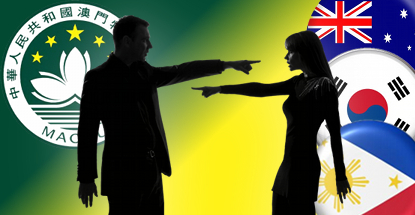 Macau casinos might want to blame other regional gaming jurisdictions for the downturn in VIP gambling activity, but a new report says this claim is overblown.
Macau casinos might want to blame other regional gaming jurisdictions for the downturn in VIP gambling activity, but a new report says this claim is overblown.
Morgan Stanley analysts issued a report this week examining the causes of Macau’s VIP decline. February’s VIP gaming revenue was off 50% year-on-year and analysts are expecting a similarly epic swoon when March numbers are released next week.
Beijing’s corruption crackdown is the prime culprit in Macau’s VIP decline, but competition from casinos in Australia, South Korea and the Philippines is routinely cited as a chief contributing factor. Leading junket operators like Suncity and David Group have made no secret of their plans to expand their presence in these markets, which are ramping up as Macau winds down.
Morgan Stanley acknowledges that these other jurisdictions have benefited from Beijing’s crackdown, but not to the degree many suspect. True, Australia’s VIP market rose 80% in the second half of 2014, while South Korea gained between 20% and 30% over the same period.
But Morgan Stanley says these numbers are illusory, given that Macau’s VIP market is 10x larger than the Philippines, 15x larger than Australia and 20x larger than South Korea. In fact, Morgan Stanley says the total gains in these markets amount to only about 10% of Macau’s VIP losses.
WOE IS US
Morgan Stanley quoted Suncity saying that it was only a year ago that the average upper-end VIP client would turn over HKD10m to HKD20m (US $1.3m to $2.6m) per gambling session. Suncity says that number has since fallen to “a couple of million.”
This week, Macau casino employee union Forefront of Macau Gaming told local broadcaster TDM that nearly 1,000 frontline casino workers had lost their jobs since the year began. An unidentified VIP room reportedly cut 200 frontline staffers (client hosts, cage cashiers, etc.) in one fell swoop.
Meanwhile, analysts are now one-upping each other to see who can predict the biggest annual decline for Macau revenue in 2015. Fitch recently downgraded its 2015 forecast from -4% to -22%, citing the usual factors plus concerns that visa and smoking restrictions will increase and new casinos not receiving as many gaming tables as they anticipated. Macquarie Research cut its 2015 forecast from -8% to -24% while Deutsche Bank expects a 30% decline and Wells Fargo is betting on a -32% shortfall.
Wells Fargo got some support from Macau chief executive Chui Sai On, who echoed the 32% figure in his 2015 Policy Address this week. Some observers think (hope?) Chui is deliberately low-balling expectations in order to put a positive spin on the final numbers at the end of the year.
